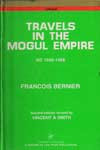 Francois Bernier was a French Traveller to the Mughal Empire in the reign of fifth Mughal Emperor Shah Jahan. He was a physician by profession. He was attached to the court of Shah Jahan and was witness to the fierce war of succession among the sons of Shah Jahan. His History of the Late Rebellion in the States of the Great Mughal, describing the war of succession, was published in 1670.
Francois Bernier was a French Traveller to the Mughal Empire in the reign of fifth Mughal Emperor Shah Jahan. He was a physician by profession. He was attached to the court of Shah Jahan and was witness to the fierce war of succession among the sons of Shah Jahan. His History of the Late Rebellion in the States of the Great Mughal, describing the war of succession, was published in 1670.After the battle of Samugah that took place in 1658 between Dara Shikoh, the heir apparent, and Aurangzeb and Murād Bakhsh, other sons of Shah Jahan, Bernier successively joined the services of Mirza Raja Jai Singh of Amber, the Portuguese at Goa and Sutan Abul Hassan Qutb Shah of Golconda. He later moved to Madras where he died in 1717. His book, Travels in the Mughal Empire, is one of the most valuable sources of the Mughal Empire.
Bernier, a physician by profession, was an eye-witness to the scene in which Dara was paraded in a most undignified manner on the streets of Delhi on 29th August 1659 before being killed on the next day.
He translated French works into Persian for Danishmand Khan, a scholar in the courts of Shah Jahan and Aurangzeb. Danishmand Khan had a fascination for European sciences and philosophy which were taught to him by Bernier who explained him the medial discoveries of William Harvey (1578-1657) and Jean Pecquet (1622-74) as well as the philosophy of Pierre Gassendi (1592-1655) and Desartes (1596-1650),
His book, Travel in the Mughal Empire, is one of the most valuable sources of the history of the Mughal empire.
so helpful for my assessment
ReplyDeleteChumsang bhutia
ReplyDelete